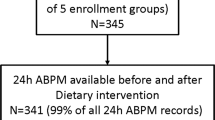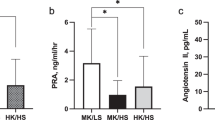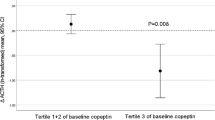Abstract
Every year, millions of Moslems throughout the world fast from sunrise till sunset daily during the month of Ramadan, that is, experience repeated cycles of fasting-refeeding. Studies in animal models have shown that repeated cycles of fasting-refeeding may cause or exacerbate hypertension. Changes in sleeping patterns as well as changes in medication timing may also influence ambulatory blood pressure. We undertook this study in order to examine the effect of the Ramadan fast on treated hypertensive subjects. Seventeen hypertensive subjects were examined, and 24-h blood pressure monitoring was carried out twice, before and during the last week of the Ramadan. All continued their medications, which were all once-daily preparations. Twenty-four hour mean blood pressure as well as average awake and average asleep blood pressure were compared. There was no difference between mean blood pressure before and during the Ramadan (138.5 ± 18.5/77.2 ± 8.1 mm Hg vs 136.4 ± 20.4/75.7 ± 5.9 mm Hg, P-nonsignificant). Blood pressure load also did not differ before and during Ramadan (systolic load 49% vs 44%, diastolic load 21% vs 18%, P-nonsignificant). Weight was reduced by 1.4 ± 1.6 kg (P < 0.002). We conclude, that according to our findings, treated, hypertensive patients may be assured that, with continuation of previous medications, traditional fasting during the month of Ramadan can be safely undertaken.
This is a preview of subscription content, access via your institution
Access options
Subscribe to this journal
Receive 12 digital issues and online access to articles
$119.00 per year
only $9.92 per issue
Buy this article
- Purchase on Springer Link
- Instant access to full article PDF
Prices may be subject to local taxes which are calculated during checkout
Similar content being viewed by others
References
Habbal R et alVariations of blood pressure during the month of Ramadan Arch Mal Coeur Vaiss 1998 91 995–998
Belkhadir J et alMuslims with non-insulin dependent diabetes fasting during Ramadan: treatment withglibenclamide BMJ 1993 307 292–295
Adlouni A et alFasting during Ramadan induces a marked increase in high-density lipoprotein cholesterol and decrease in low-density lipoprotein cholesterol Ann Nutr Metab 1997 41 242–249
Ernsberger P, Nelson DO Refeeding hypertension in dietary obesity Am J Physiol 1988 254 R47–R55
Contreras RJ et alDietary obesity and weight cycling in rats: a model of stress-induced hypertension? Am J Physiol 1991 261 R848–R857
Ernsberger P, Koletsky RJ, Baskin JS, Foley M Refeeding hypertension in obese spontancously hypertensive rats Hypertension 1994 24 699–705
Ernsberger P, Koletsky RJ, Baskin JS, Collins LA Consequences of weight cycling in obese spontaneously hypertensive rats Am J Physiol 1996 270 R864–R872
Ernsberger P, Nelson DO Effects of fasting and refeeding on blood pressure are determined by nutritional state, not by body weight change Am J Hypertens 1988 1 153S–157S
Bursztyn M, Mekler J, Wachtel N, Ben-Ishay D Siesta and blood pressure monitoring: comparability of the afternoon nap and night sleep Am J Hypertens 1994 7 217–221
Bursztyn M, Mekler J, Ben-Ishay D The siesta and ambulatory blood pressure: is waking up the same in the morning and afternoon? J Hum Hypertens 1996 10 287–292
Kain HK, Hinman AT, Sokolov M Arterial blood pressure measurements with a portable recorder in hypertensivepatients Circulation 1964 30 882–892
Palatini P et alFactors affecting ambulatory blood pressure reproducibility. Results of the HARVEST trial. Hypertension and ambulatory recording Venetia study Hypertension 1994 23 211–216
Conway J et alThe use of ambulatory blood pressure monitoring to improve the accuracy and reduce the numbers of subjects in clinical trials of antihypertensive agents J Hypertens 1988 6 111–116
Mancia G et alLack of placebo effect on ambulatory blood pressure Am J Hypertens 1995 8 311–315
Mutti E et alEffect of placebo on 24-hour non-invasive ambulatory blood pressure J Hypertens 1991 9 361–364
Author information
Authors and Affiliations
Corresponding author
Rights and permissions
About this article
Cite this article
Perk, G., Ghanem, J., Aamar, S. et al. The effect of the fast of Ramadan on ambulatory blood pressure in treated hypertensives. J Hum Hypertens 15, 723–725 (2001). https://doi.org/10.1038/sj.jhh.1001262
Received:
Revised:
Accepted:
Published:
Issue Date:
DOI: https://doi.org/10.1038/sj.jhh.1001262
Keywords
This article is cited by
-
The safety of Ramadan Fasting following Percutaneous Coronary Intervention
BMC Cardiovascular Disorders (2020)
-
Blood pressure evaluated by 24 h ambulatory blood pressure monitoring in Ramadan-fasting patients with corticotrope deficiency
Endocrine (2020)
-
Ethical conflicts in the treatment of fasting Muslim patients with diabetes during Ramadan
Medicine, Health Care and Philosophy (2017)
-
Effects of Ramadan fasting on cardiovascular risk factors: a prospective observational study
Nutrition Journal (2012)
-
Impact of caloric and dietary restriction regimens on markers of health and longevity in humans and animals: a summary of available findings
Nutrition Journal (2011)



